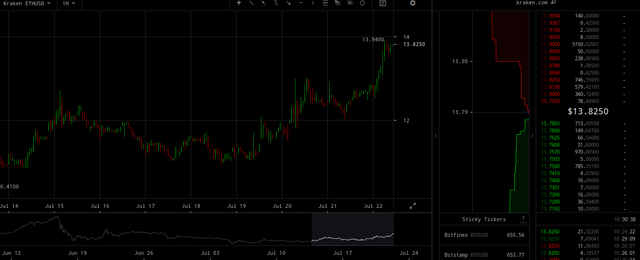How High Will Post-Hard Fork, Post-Coinbase Ethereum Go and Is It on a Collision Course with Steem?

It's news to no one in the crypto space right now that Ethereum has successfully completed it's hardfork to return about 12 million ETH from the Whitehat DAO and Dark DAO to the WithdrawDAO recovery contract.
Almost simultaneously, Coinbase announced that ETH would be available on it's retail site for instant purchase with credit/debit cards. Previously, Coinbase had supported ETH acquisition on it's exchange site, GDAX, through BTC exchange or ACH deposit. This shift was not an enormously significant one in terms of the ETH acquisition experience of experienced crypto traders who are accustomed to acquiring altcoins on exchanges.
However, to the all-important mainstream adopters, this shift was a sea change since to them the experience of buying on Coinbase's retail site with debit/credit cards (at least once you get past the KYC/AML requirements) feels like an amazon purchase. On the other hand, buying on an exchange feels more like bad flashbacks to high school algebra exams.
The result over the last 30 hours has been a positive swing in the ETH price of almost (update: over) $2 dollars:

Of course, no one has forgotten that ETH was up around $21 during the BTC pre-Halvening rush and prior to the DAO exploit crash. So, ETH can still climb over 50% from its price today without hitting it's previous all-time high.
The real question is this: How high will ETH be 12 months from today?
On top of all this, one can't forget that ETH's valuation as of yet has been based almost entirely on projected potential. We haven't yet seen the power of ETH's turing complete programming language surfing on the back of a cryptocurrency that can settle trades MUCH quicker than bitcoin and without all of bitcoin's block size civil unrest. TheDAO was supposed to be ETH's first big application: a decentralized Crypto VC fund; owned by anyone who got in on the token sale, theoretically controlled by no one, and which would fund all the economically and technologically disruptive brilliance that was yet to come. A titanic proposition with a Titanic result. Except, in this case, Vitalik and gang were able to get the life rafts out in time to save the passengers.
Now Ethereum, a little older and wiser, will move on to the next big projects. The Augur prediction market system has for a long time been heralded as one of the brightest future stars in the ETH constellation. Time will tell if it amounts to nothing more than homebase for a bunch of crypto enthusiasts trying to guess the price of BTC or if it will turn every person with an internet connection and some level of knowledge about anything into a node in a hyper-accurate global crystal ball / infinite oracle. So, for some reason you're web surfing for the last 12 months has led you down a rabbit hole that led to you being the most knowledgeable person in the world about municipal politics in Ulaanbaatar outside of Mongolia? Maybe Augur can put your knowledge to work Uber-style so that foreign corporations can guess whether the next city government will be for or against development, and get you paid some crypto in the process. This commoditization of knowledge by way of prediction markets could turn out to be the world's biggest casino where the players luck is not determined by simple chance minus the house advantage, but instead is proportionate to their specialized knowledge. Augur will be a great experiment into the unknown.
The flip side of that coin is "the known". This is where Steem/Steemit comes in. Steem has already proved that "a blockchain database that supports community building and social interaction with cryptocurrency rewards" is a concept that will be enthusiastically embraced. People love to create and curate content on sites like Reddit and Facebook. You know what they love more than that? Getting paid to do it. It seems unlikely that many Ethereum developers aren't taking notes on what Steem/Steemit has become in such a short span of time.
A quick peek at the Ethereum subreddit today shows a thread called "Will the Akasha be Ethereum's Steemit?" (See https://www.reddit.com/r/ethereum/comments/4u2kyo/will_the_akasha_be_ethereums_steemit/). This is the same question that's been stuck in my head since the first moment I saw Steemit. It seems inevitable that something very much like Steemit will emerge on the Ethereum platform. What will it's interaction/competition with Steemit look like? Is Steemit the myspace to some Ethereum Facebook? Will the two coexist with slightly different use functions like Facebook and Reddit? Will we go through a balkanization period where many Steemit clones will pop up on Ethereum to coexist alongside Steemit with each being it's own tiny tribal community? Would such a period be followed by consolidation of users in a single winning Steemit type community?
What do my fellow Steemians think?
#steem #ethereum #bitcoin #augur
Who the hell is OP?
I'm just a crypto enthusiast like you guys. As a little kid in the 1980s, my dad brought home a Texas Instruments computer that I think was this one (the TI-99/4A):

I played "Hunt the Wumpus" until my eyes burned.

I think I also figured out how to write commands to get the machine to make different tones. I could be making that last part up. But, I have some kind of foggy memory about that.
Decades later, I read a white paper and watched with fascination as the Japanese domiciled creation of a cat-loving -starbucks-swilling French guy reached it's peak and then burned. Luckily, I didn't have any BTC caught up in the Mt. Gox debacle. I've just been trading and unable to stop thinking about this crypto world since then.
If Ethereum takes too long to make a Steemit clone, they might be fighting an uphill battle. Don't underestimate first mover advantage. Just look at Bitcoins market cap, even though there's coins out there with way more features and transaction capacity. Competition is a good thing!
I can definitely agree with that. Competition only drives the individual communities to achieve better/greater functionality. It'll be interesting to see how deep into it's first mover advantage Steemit is when the first Ethereum competitor goes live. Will it be Facebook overtaking Myspace or will it be Google+ pretending it can compete with Facebook?
Good!